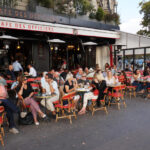A Typical Long-Distance Train Ride.
I have been told by LSA’s in Amtrak dining cars that there is someone on almost every trip who shows up in the dining car and asks to be seated alone. I suppose it’s because they are either very shy or terrible snobs, but whichever it is, they’re making a big mistake. And, for the record, their request is always politely denied.
The “community seating” in an Amtrak diner is, for me, one of the reasons I do so enjoy train travel. Take, for instance, these encounters–all occurring on my recent return trip from the NARP meeting in Chicago on the California Zephyr and the Coast Starlight.
A young couple from Australia who were crossing the U.S. by train after completing their hike of the Appalachian Trail. They started at the mid-point—in Harper’s Ferry, West Virginia—and headed north to Maine from there. Then they flew back to their original starting point and hiked south. They did it that way in order to have weather the entire time that was neither too hot nor too cold. It was interesting, but not surprising, to hear them say that they found the Trail crowded with hikers.
A retired Episcopal priest who had been assigned to parishes all over the western United States, in both wealthy communities and poor ones. Two minutes into our conversation, it became apparent that he was also a train enthusiast—somehow it seems inappropriate to call the guy a foamer—with an encyclopedia knowledge of railroads and trains and rail equipment. Who could have guessed?
A delightful woman who is a licensed nurse running a hospice facility in Southern California. I would have loved the opportunity to engage her in serious conversation, but lunch in an Amtrak dining car is really not the place. Perhaps if it had been just the two of us. Nevertheless, it took about 30 seconds for everyone at the table to realize that this was a very special individual.
Then there was her husband—a man in his mid-50s who had been born in Leipzig, East Germany. As a teenager and at great personal risk, he escaped in 1979—fully 10 years before the infamous wall came down. Making his way to the U.S., he has become a U.S. citizen and a very successful businessman. Soft-spoken and modest, without the slightest trace of an accent, he brought with him an instinctive opposition to anything that smacks of socialism, which led to a very cordial discussion on the pros and cons of the federal government subsidizing public transportation.
Now . . . ask me again why I prefer traveling by train to flying.



You wouldn’t call the Rev. W. W. Awdry a foamer, either. Or Bishop Eric Treacy. Your seat-mate has distinguished colleagues.
Who knows? Perhaps they would all be flattered.
Harper’s Ferry is in West Virginia, not Virginia. They are two separate states.
You’re right, of course. My bad!
Agreed. The dining car was one of my favorite things about my trip. It was even better running into the people I had met around the train at random times.